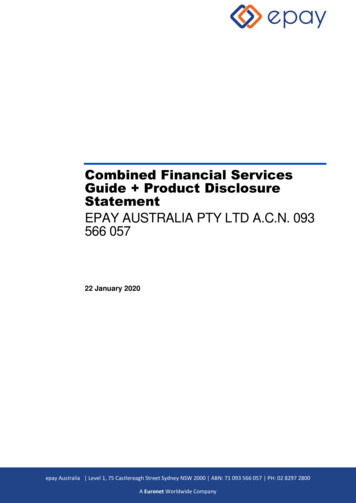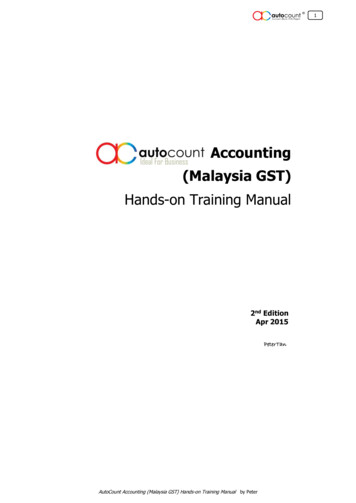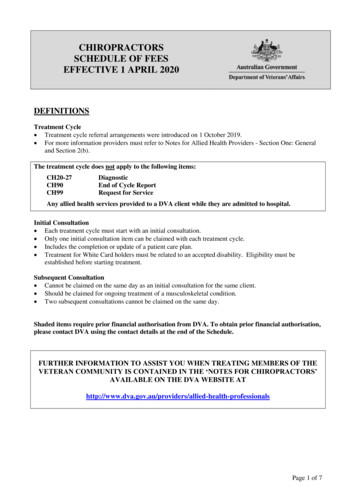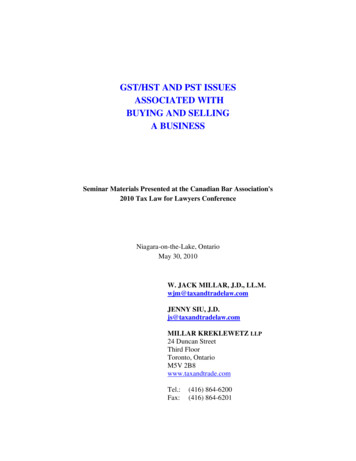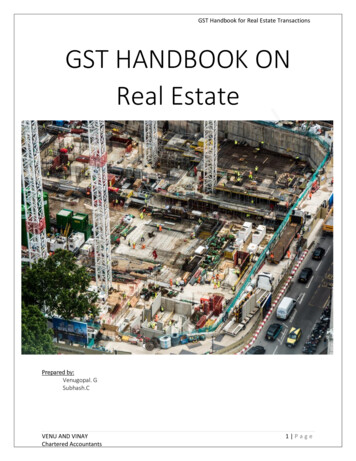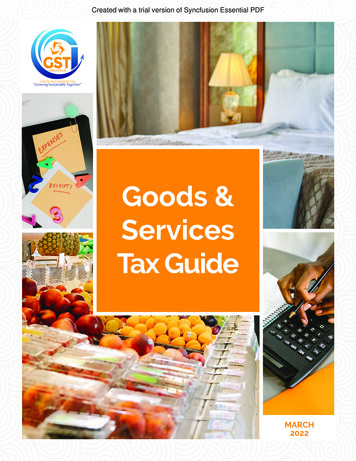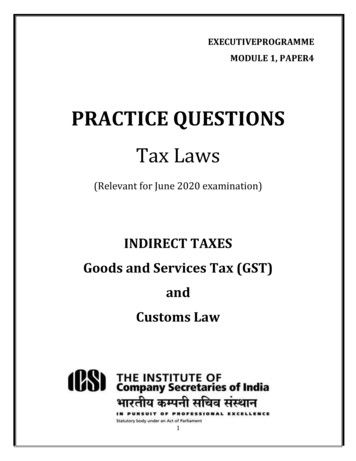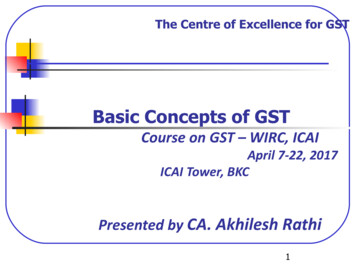
Transcription
The Centre of Excellence for GSTBasic Concepts of GSTCourse on GST – WIRC, ICAIApril 7-22, 2017ICAI Tower, BKCPresented by CA. Akhilesh Rathi1
Agenda Need for GST Benefits of GST Tax Structure Importantdefinitions Point of TaxationCourse on GST (WIRC, ICAI)April 7-22, 20172Basic Concepts of GST
Chartered Accountants are partners in NationBuilding. For us, GST representsOpportunityAs well asResponsibilityCourse on GST (WIRC, ICAI)April 7-22, 20173Basic Concepts of GST
Need for GST Uniform tax across the countryReduce cascading effect of taxationSimplified & Unified Tax SystemMore transparency & Better ComplianceDrastic improvement in Information TechnologyStrict regulations with focus on tax maximizationReduce interface with different departmentsPrinciples of consumption based taxBasic Concepts of GSTCourse on GST (WIRC, ICAI)April 7-22, 20174
Benefits of GST GST will bring more transparency and better complianceIn the long run, the lower tax burden could translate into lower prices ongoods for consumers.The tax structure will be made lean and simpleEase of doing businessIncrease in GDPReduction in tax evasionMore competitive productIncrease in RevenueSimplify collection systemBasic Concepts of GSTCourse on GST (WIRC, ICAI)April 7-22, 20175
GST : Key Features Dual GST comprising of State GST & Central GST; Integrated GST on inter-statesuppliesIntegration of prevailing indirect taxes to ensure uniformity (Basic Customs dutyto continue)Simplified compliances; Single taxable event and valuation basePreventing cascading of taxes; abolition of non-creditable tax costs i.e. CSTCredit available across goods & services; including for inter-state procurementsleading to higher creditsStandardized classification of goods/services should result in reducing litigationGST leviable on transaction valueHarmonization of Centre and State taxes to achieve common marketCourse on GST (WIRC, ICAI)April 7-22, 2017Basic Concepts of GST6
GST : Key Features GST will cover whole of India, excluding the State of J&K.Reverse charge of existing provisions extended to goods as well.Definition of services defined to mean other than goods; actionable claimsregarded as serviceRegistrations will be automatic migration to PAN based registration; option toobtain registration business vertical-wiseExtensive provisions including distribution of credits to business verticals withsame PAN.Certain supplies deemed to be services like Intangibles, transfer of right to useand actionable claims.Supply to include free supplies.Taxability of activities between branch and HO.Course on GST (WIRC, ICAI)April 7-22, 2017Basic Concepts of GST7
Existing Tax Structure in IndiaTax StructureIndirectTaxDirect TaxIncome TaxCentral Taxes Course on GST (WIRC, ICAI)April 7-22, 2017Basic Customs dutyCentral Excise DutyAdditional customsduties (CVD)Service Tax (Levied byCentre)Special Additional Dutyof Customs (SAD)The Excise Duty leviedunder the Medicinal andToiletries Preparations(Excise Duties) Act 1955Central Sales Tax(Levied by Centre andcollected by States)Various auxiliary levies(such as R&D Cess)Surcharges and Cesseslevied by CentreState Taxes State-VATCentral Sales Tax (Levied byCentre and collected byStates)Entry TaxLuxury TaxEntertainment tax (unless itis levied by the localbodies)Purchase TaxTaxes on Lotteries andGamblingStamp duty and propertytaxMunicipal leviesElectricity dutyState Cesses andSurcharges in so far as theyrelate to supply of goodsand services
Proposed Tax StructureTaxes proposed to be subsumed within GST are as follows:StatusWhat iscoveredAt Central level What is notcovered Central Excise dutyDuties of Excise (Medicinal and ToiletPreparations)Additional Duties of ExciseAdditional Duties of Excise (Textiles &Textile Products)Additional Duties of Customs (commonlyknown as CVD)Special Additional Duty of Customs (SAD)Service Tax (Levied on services by Centre)Central Surcharges and Cesses so far as theyrelate to supply of goods and servicesBasic Customs dutyAt State level Course on GST (WIRC, ICAI)April 7-22, 2017State Value Added Tax (VAT)Central Sales Tax (CST)Luxury TaxOctroiEntertainment and Amusement Tax (except whenlevied by the local bodies)Taxes on advertisementsEntry Tax/Local Body Tax (LBT) (all forms)Purchase TaxTaxes on lotteries, betting and gamblingState Surcharges and Cesses so far as they relateto supply of goodsStamp duty and property taxAny municipal levy through delegatedlegislationElectricity dutyOther specified levies such as road tax &passenger tax & labour cess , Excise onAlcohol for human consumption9Basic Concepts of GST
GST: Proposed Tax StructureProposed Tax StructureIndirect TaxDirect TaxIncome TaxIntra StateState GST(SGST)StateInter StateIntegrated GST(IGST)Central GST(CGST)Dual GSTCentreGoods and Service TaxCourse on GST (WIRC, ICAI)April 7-22, 201710Basic Concepts of GST
Concepts of CGST, SGST, UGST &IGSTCourse on GST (WIRC, ICAI)April 7-22, 201711Basic Concepts of GST
Destination Based TaxationnDestination Based Taxation as the name suggests is the taxation based ondestination or consumption of the goods or services.nThis principle seeks to tax the goods and services where their consumptiontakes place rather than the point where their origin takes place i.e. productionand the entire revenue relating to the goods or services should accrue in thejurisdiction where they are being ultimately consumed.nFor Example. If A in M.P. produces the goods and sells the goods to B inGujarat, then in such case the tax should be levied and collected and shouldaccrue on the goods in the State of Gujarat and not in the State of M.P. Therevenue in the case of destination based taxation belongs to the place, wherethe goods are finally consumed and not to the State where the goods areproduced.Course on GST (WIRC, ICAI)April 7-22, 201712Basic Concepts of GST
Origin Based Taxation:nOrigin Based Taxation as the name proposes is the taxation based on origin or sourcewhere the goods and services are produced.nThis principle seeks to tax the goods and services where their production ororigination takes place rather than where their consumption takes place. Therefore, incase of origin based taxation, the revenue accrues to the jurisdiction where goodsand services are produced.nFor Example If A in Tamilnadu produces the goods and sells the goods to B in Delhi,then in such case the tax should be levied and collected in the State of Tamilnaduand not in the State of Delhi. The revenue in the case of origin based taxation shouldaccrue to the place, where the goods or services are produced and not to the Statewhere they are consumed.nThe basic difference between the two lies in the fact that origin based taxation seeksto levy and collect tax on the basis of location of production and destination basedtaxation seeks to levy and collect tax on the basis of location of consumption.Course on GST (WIRC, ICAI)April 7-22, 201713Basic Concepts of GST
Course on GST (WIRC, ICAI)April 7-22, 201714Basic Concepts of GST
Course on GST (WIRC, ICAI)April 7-22, 201715Basic Concepts of GST
Impact of GSTGSTImpactCourse on GST (WIRC, ICAI)April 7-22, 201716Basic Concepts of GST
Point of taxation under currentregimeCourse on GST (WIRC, ICAI)April 7-22, 201717Basic Concepts of GST
Important DefinitionsCourse on GST (WIRC, ICAI)April 7-22, 201718Basic Concepts of GST
Meaning of Taxable Person(1) Every supplier shall be liable to be registered under this Act in the State orUnion territory, other than special category States, from where he makes ataxable supply of goods or services or both, if his aggregate turnover in afinancial year exceeds twenty lakh rupees:Provided that where such person makes taxable supplies of goods or servicesor both from any of the special category States, he shall be liable to beregistered if his aggregate turnover in a financial year exceeds ten lakh rupees.Meaning of “aggregate turnover” means the aggregate value of all taxablesupplies (excluding the value of inward supplies on which tax is payable by aperson on reverse charge basis), exempt supplies, exports of goods or servicesor both and inter-State supplies of persons having the same Permanent AccountNumber, to be computed on all India basis but excludes central tax, State tax,Union territory tax, integrated tax and cessCourse on GST (WIRC, ICAI)April 7-22, 201719Basic Concepts of GST
Meaning of Taxable Person Cont.(2) Every person who, on the day immediately preceding the appointed day, isregistered or holds a license under an existing law, shall be liable to be registeredunder this Act with effect from the appointed day.(3) Where a business carried on by a taxable person registered under this Act istransferred, whether on account of succession or otherwise, to another person as agoing concern, the transferee or the successor, as the case may be, shall be liable tobe registered with effect from the date of such transfer or succession.(4) Notwithstanding anything contained in sub-sections (1) and (3), in a case oftransfer pursuant to sanction of a scheme or an arrangement for amalgamation or, asthe case may be, de-merger of two or more companies pursuant to an order of a HighCourt, Tribunal or otherwise, the transferee shall be liable to be registered, with effectfrom the date on which the Registrar of Companies issues a certificate of incorporationgiving effect to such order of the High Court or Tribunal.Course on GST (WIRC, ICAI)April 7-22, 201720Basic Concepts of GST
Agent Sec 2(5) of CGST Act“agent” means a person, including a factor, broker, commission agent, arhatia,del credere agent, an auctioneer or any other mercantile agent, by whatevername called, who carries on the business of supply or receipt of goods orservices or both on behalf of anotherNote : This list is illustrative list not exhaustive listUnder the revised law the term “intermediary” has been deleted from thenew definition as well as the words ” whether of the same description ashereinafter mentioned or not” As a result the intermediaries will not betreated as agents.Course on GST (WIRC, ICAI)April 7-22, 201721Basic Concepts of GST
Business Sec 2(17) of CGST ActCourse on GST (WIRC, ICAI)April 7-22, 201722Basic Concepts of GST
Business Sec 2(17) of CGST ActCourse on GST (WIRC, ICAI)April 7-22, 201723Basic Concepts of GST
Business verticalSec 2 (18) of CGST Act“business vertical” means a distinguishable component of an enterprise that isengaged in the supply of individual goods or services or a group of related goodsor services which is subject to risks and returns that are different fromthose of the other business verticals.Factors that should be considered in determining whether goods or services arerelated include––the natureof thegoods orservicesthe natureoftheproductionprocesses;the type or class ofthe nature of thegoods or servicescustomers for thegoods or services;the methodsused todistribute thegoods or supplyof servicesthe nature ofregulatory environment(wherever applicable),including banking,insurance, or publicutilitesFor Example :- X Ltd is a diversified company having divisions in textiles,cement, chemicals etc. then each such divisions/business verticals may beregistered separately.Course on GST (WIRC, ICAI)April 7-22, 201724Basic Concepts of GST
Capital goods Sec 2(19) of CGST Act“capital goods” means goods, the value of which is capitalised in the booksof account of the person claiming the input tax credit and which are used orintended to be used in the course or furtherance of businessExample: Plant and machinery capitalized in the books of accounts could beconsidered as capital goods for claiming credit of tax paid.Course on GST (WIRC, ICAI)April 7-22, 201725Basic Concepts of GST
Casual taxable personSec 2(20) ofCGST Act“casual taxable person” means a person who occasionally undertakes transactionsinvolving supply of goods or services or both in the course or furtherance of business,whether as principal, agent or in any other capacity, in a State or a Union territorywhere he has no fixed place of businessNotes: Compulsory Registration of Casual Taxable Person under GST irrespective of thethreshold GST Registration form for Casual Taxable Person Application for extension of GST registration period by Casual / Non-Residenttaxable person. Validity period of the Registration certificate issued to a Casual Taxable Person andnon Resident Taxable person Advance tax to be paid by a Casual Taxable Person and Non-resident TaxablePerson at the time of obtaining Registration under this Special CategoryCourse on GST (WIRC, ICAI)April 7-22, 201726Basic Concepts of GST
Fixed EstablishmentSec 2(50) of CGST Actfixed establishment” means a place (other than the registered place ofbusiness) which is characterised by a sufficient degree of permanenceand suitable structure in terms of human and technical resources tosupply services, or to receive and use services for its own needsCourse on GST (WIRC, ICAI)April 7-22, 201727Basic Concepts of GST
ConsiderationSec 2(31) of CGST ACT“consideration” in relation to the supply of goods or services or both includes–(a) any payment made or to be made, whether in money or otherwise, inrespect of, in response to, or for the inducement of, the supply of goods orservices or both, whether by the recipient or by any other person but shall notinclude any subsidy given by the Central Government or a State Government;(b) the monetary value of any act or forbearance, in respect of, in responseto, or for the inducement of, the supply of goods or services or both, whetherby the recipient or by any other person but shall not include any subsidygiven by the Central Government or a State Government:Provided that a deposit given in respect of the supply of goods or services orboth shall not be considered as payment made for such supply unless thesupplier applies such deposit as consideration for the said supply;Course on GST (WIRC, ICAI)April 7-22, 201728Basic Concepts of GST
GoodsSec 2(52) of CGST ACT“goods” means every kind of movable property other than money and securitiesbut includes actionable claim, growing crops, grass and things attached to orforming part of the land which are agreed to be severed before supply or undera contract of supply;Excludes :- Money & SecuritiesArticle 366(12) of the Constitution of India gives an inclusive definition of ‘goods’which says that ‘Goods’ includes all materials, commodities and articles;Under exisiting laws, certain transactions are classified as goods and services.Under GST, a transaction would strictly be classified as goods or servicesCourse on GST (WIRC, ICAI)April 7-22, 201729Basic Concepts of GST
InputsSec 2(59) of CGST Act“Input” means any goods other than capital goods used or intended to be usedby a supplier in the course or furtherance of business”.Course on GST (WIRC, ICAI)April 7-22, 201730Basic Concepts of GST
Input serviceSec 2(60) of CGST Act“input service” means any service used or intended to be used by a supplier inthe course or furtherance of businessCourse on GST (WIRC, ICAI)April 7-22, 201731Basic Concepts of GST
Input service DistributorSec 2(61) ofCGST Act“Input Service Distributor” means an office of the supplier of goods or services orboth which receives tax invoices issued under section 31 towards the receipt ofinput services and issues a prescribed document for the purposes of distributing thecredit of central tax, State tax, integrated tax or Union territory tax paid on the saidservices to a supplier of taxable goods or services or both having the samePermanent Account Number as that of the said office;An ISD is required to obtain a separate registration even though it may beseparately registered.The threshold limit of registration is not applicable to ISD.The common credit used by all the recipients can be distributed by ISD on pro ratabasis i.e. based on the turnover of each recipient to the aggregate turnover of allthe recipients to which credit is distributedCourse on GST (WIRC, ICAI)April 7-22, 201732Basic Concepts of GST
Job Work Sec 2(68) of CGST Act“job work” means any treatment or process undertaken by a person on goodsbelonging to another registered person and the expression “job worker” shallbe construed accordinglyJob work means any person who undertakes any activity or carried on anyprocess on goods belonging to another person. Such other person necessarilybe a registered taxable person. If the person is unregistered one then the jobwork relation could not be established under GST law. Further, goods sent forjob work should be taxable goods as duty liability will arise only when goodsunder consideration are taxableCourse on GST (WIRC, ICAI)April 7-22, 201733Basic Concepts of GST
ManufactureSec 2(72) of CGST Act“manufacture” means processing of raw material or inputs in any manner thatresults in emergence of a new product having a distinct name, character anduse and the term “manufacturer” shall be construed accordinglyCourse on GST (WIRC, ICAI)April 7-22, 201734Basic Concepts of GST
Person Sec 2(72) of CGST Act“person” includes—(a) an individual;(b) a Hindu Undivided Family;(c) a company;(d) a firm;(e) a Limited Liability Partnership;(f) an association of persons or a body of individuals, whether incorporated or not,in India or outside India;(g) any corporation established by or under any Central Act, State Act or ProvincialAct or a Government company as defined in clause (45) of section 2 of theCompanies Act, 2013;Course on GST (WIRC, ICAI)April 7-22, 201735Basic Concepts of GST
Person Sec 2(72) of CGST Act(h) any body corporate incorporated by or under the laws of a country outsideIndia;(i) a co-operative society registered under any law relating to co-operativesocieties;(j) a local authority;(k) Central Government or a State Government;(l) society as defined under the Societies Registration Act, 1860;(m) trust; and(n) every artificial juridical person, not falling within any of the above;Course on GST (WIRC, ICAI)April 7-22, 201736Basic Concepts of GST
Reverse ChargeSec 2(98) of CGST Act“reverse charge” means the liability to pay tax by the recipient of supply ofgoods or services or both instead of the supplier of such goods or services orboth under sub-section (3) or sub-section (4) of section 9, or under sub-section(3) or subsection (4) of section 5 of the Integrated Goods and Services Tax ActNotes : Reverse charge means the liability to pay tax is by the recipient ofgoods/services instead of the supplier the purpose of this charge is to increasetax compliance and tax revenues Reverse charge may be applicable for both services as well as goods.Categories of supplies applicable for reverse charge will be notified by theCentre or State Government.Course on GST (WIRC, ICAI)April 7-22, 201737Basic Concepts of GST
Output tax Sec 2(60) of CGST Act“output tax” in relation to a taxable person, means the tax chargeable underthis Act on taxable supply of goods or services or both made by him or by hisagent but excludes tax payable by him on reverse charge basisOutput tax is GST charged and collected on sales/supplies of goods andservices.Course on GST (WIRC, ICAI)April 7-22, 201738Basic Concepts of GST
Outward supplySec 2(83) of CGST Act“outward supply” in relation to a taxable person, means supply of goods orservices or both, whether by sale, transfer, barter, exchange, licence, rental,lease or disposal or any other mode, made or agreed to be made by suchperson in the course or furtherance of business;Course on GST (WIRC, ICAI)April 7-22, 201739Basic Concepts of GST
ExportsSec 2(5) of IGST Act“export of goods” with its grammatical variations and cognate expressions,means taking goods out of India to a place outside IndiaUnder GST regime, exports are proposed to be Zero rated which means thatthe export goods would not suffer any actual tax liability although the inputsfor them would be tax paid which would be subsequently neutralized by refundmade to the exporter.This would serve two objectives simultaneously. On the one hand, the ITCchain through the various dealers will not be broken and on the other hand,the exporter of the finished goods will get the refund of the GST paid on theinputs or on finished goods thereby making the exports actually free from theburden of taxes.Course on GST (WIRC, ICAI)April 7-22, 201740Basic Concepts of GST
Export of ServicesSec 2(6) of IGST Act“export of services” means the supply of any service when,––(i) the supplier of service is located in India;(ii) the recipient of service is located outside India;(iii) the place of supply of service is outside India;(iv) the payment for such service has been received by the supplier of service inconvertible foreign exchange; and(v) the supplier of service and the recipient of service are not merelyestablishments of a distinct person in accordance with Explanation 1 in section 8;Course on GST (WIRC, ICAI)April 7-22, 201741Basic Concepts of GST
RecipientSec 2(93) of CGST Act“recipient” of supply of goods or services or both, means—(a) where a consideration is payable for the supply of goods or services orboth, the person who is liable to pay that consideration;(b) where no consideration is payable for the supply of goods, the personto whom the goods are delivered or made available, or to whom possessionor use of the goods is given or made available; and(c) where no consideration is payable for the supply of a service, theperson to whom the service is rendered, and any reference to a person towhom a supply is made shall be construed as a reference to the recipient of thesupply and shall include an agent acting as such on behalf of the recipient inrelation to the goods or services or both supplied;Course on GST (WIRC, ICAI)April 7-22, 201742Basic Concepts of GST
Input TaxSec 2(62) of CGST Act“input tax” in relation to a registered person, means the central tax, State tax,integrated tax or Union territory tax charged on any supply of goods or servicesor both made to him and includes—(a) the integrated goods and services tax charged on import of goods;(b) the tax payable under the provisions of sub-sections (3) and (4) of section 9;(c) the tax payable under the provisions of sub-section (3) and (4) of section 5of the Integrated Goods and Services Tax Act;(d) the tax payable under the provisions of sub-section (3) and sub-section (4)of section 9 of the respective State Goods and Services Tax Act; or(e) the tax payable under the provisions of sub-section (3) and sub-section (4)of section 7 of the Union Territory Goods and Services Tax Act,but does not include the tax paid under the composition levyCourse on GST (WIRC, ICAI)April 7-22, 201743Basic Concepts of GST
Input Tax Credit Mechanism“input tax credit” means the credit of input taxnCredit of SGST can’t be use for CGST & Vice Versa.Course on GST (WIRC, ICAI)April 7-22, 201744Basic Concepts of GST
DisclaimerThe information in this presentation was compiled from various sources believedto be reliable for informational purposes only.While every efforts have been made to keep the information cited in thispresentation error free, the Institute or any office do not take the responsibilityfor any typographical or clerical error which may have crept in while compilingthe information provided in this presentation. Further, the information providedin this presentation are subject to the provisions contained under different actsand members are advised to refer to those relevant provision also.Course on GST (WIRC, ICAI)April 7-22, 201745Basic Concepts of GST
Thank YouCA. Akhilesh RathiCourse on GST (WIRC, ICAI)April 7-22, 2017Basic Concepts of GST46
7 GST : Key Features Basic Concepts of GST GST will cover whole of India, excluding the State of J&K. Reverse charge of existing provisions extended to goods as well. Definition of services defined to mean other than goods; actionable claims regarded as service Registrations will be automatic migration to PAN based registration; option to .
